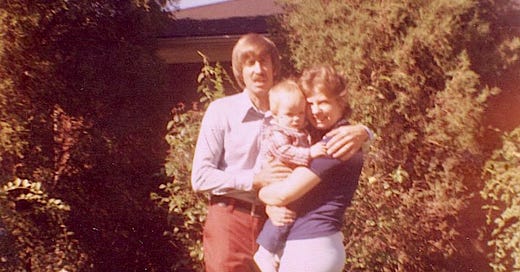Born into the Search
Genealogy has been part of my life for as long as I can remember. It’s not just something I do; it’s how I see the world. My love for family history is an inheritance passed down through curiosity, preservation, and a deep sense of connectedness—to my ancestors, my community, and the broader human story.
Both of my parents were family historians in their own right. As a Gen-X child, I spent many weekends in cemeteries, courthouses, libraries, and historical societies. I watched them pore over dusty records, examine weathered gravestones for clues, and piece together our family’s story one document at a time. Many distant cousins would visit while passing through, and my parents would drive hours to interview relatives they had never met, armed with a tape recorder, pedigree charts, and a handful of letters exchanged over the years.
Those early experiences shaped me. I learned that history isn’t just something in textbooks; it’s personal. It lives in the memories of others, in overlooked records, and in stories waiting to be rediscovered.
My connection to archival preservation runs even deeper. My mother’s cousin was an archivist who led the microfilming department at Notre Dame University. He understood the value of ephemera—the everyday scraps of life that many discard but historians treasure. His gravestone reads, “Today's Trash is Tomorrow’s Treasure,” a phrase that has stayed with me. When I was age ten, my parents took me to the Notre Dame University Library, where we met an archivist who showed us the Francis Patrick Clark Collection. It filled an entire room. That moment cemented for me the sheer scale and importance of preserving history.
The Intellectual Pursuit
Genealogy is a puzzle that demands logic, critical thinking, deductive reasoning, kindness, and tenacity. Answers are often hidden in the margins, lost in translation, or waiting in an unexpected record or location. The search itself is just as rewarding as the discoveries.
Each breakthrough—whether identifying an ancestor’s hometown, uncovering a maiden name, solving a long-standing mystery, or connecting distant family lines—feels like striking gold. But more than that, the process keeps my mind sharp, my curiosity engaged, and my appreciation for history ever-growing.
A Lifelong Connection
Genealogy isn’t just about the past. It’s about relationships. Over two decades of active research, I’ve met many distant cousins I never knew existed, formed friendships with fellow researchers, and collaborated on projects that bring people together in ways only family history can.

It has also strengthened the relationships I already have. Researching my ancestors has deepened my understanding of my family’s values, struggles, and traditions. It has given me a greater appreciation for my parents’ dedication to preserving our history and a sense of responsibility to continue that legacy.

An Emotional Anchor
I genealogize because I believe, like strands of DNA, the values of my ancestors guide my decisions. Their resilience, choices, and sacrifices echo in the lives we lead today. They don’t make my choices for me, but their voices aren’t silent when I weigh them. I believe they want me to meet my distant cousins and to look in their eyes and see the traces of our shared past—the same determination, the same laughter, the same reflections of those who came before us. In them, I find familiar expressions, untold stories, and a renewed sense of belonging. These connections are more than coincidences; they are living proof that our ancestors' legacies endure, not just in records and heirlooms but in the people who carry their blood and spirit forward.
There is something profoundly moving about standing where an ancestor lived, visiting their grave, touching a document they signed, or holding an object passed down through generations. My grandmother’s paintings, my grandfather’s handcrafted furniture, and a rosebush brought over from Germany in the 1840s that still blooms each May in my garden—these are more than heirlooms. They are, as June Carter Cash described, klediments: objects infused with deep personal and familial significance. They remind me that history isn’t distant or abstract. It’s personal.
Why It Matters Now More Than Ever
We live in a time when history is debated, rewritten, or forgotten altogether. Identity feels fluid, and the stories we tell about our past shape how we see ourselves in the present. Genealogy grounds me in something real. It reminds me that history isn’t an impersonal force. It is made up of individual lives, choices, and experiences.
Genealogy teaches me context, patience, kindness, tenacity, and perspective. It encourages me to look beyond surface-level narratives and dig deeper for truth. It reminds me that our ancestors were complex people living in complicated times—just as we are today.
I genealogize because their stories matter. The past is fragile, slipping away with each passing day. But in seeking them, I find myself.
This is why I genealogize.





I love this personal touch and the family photos.